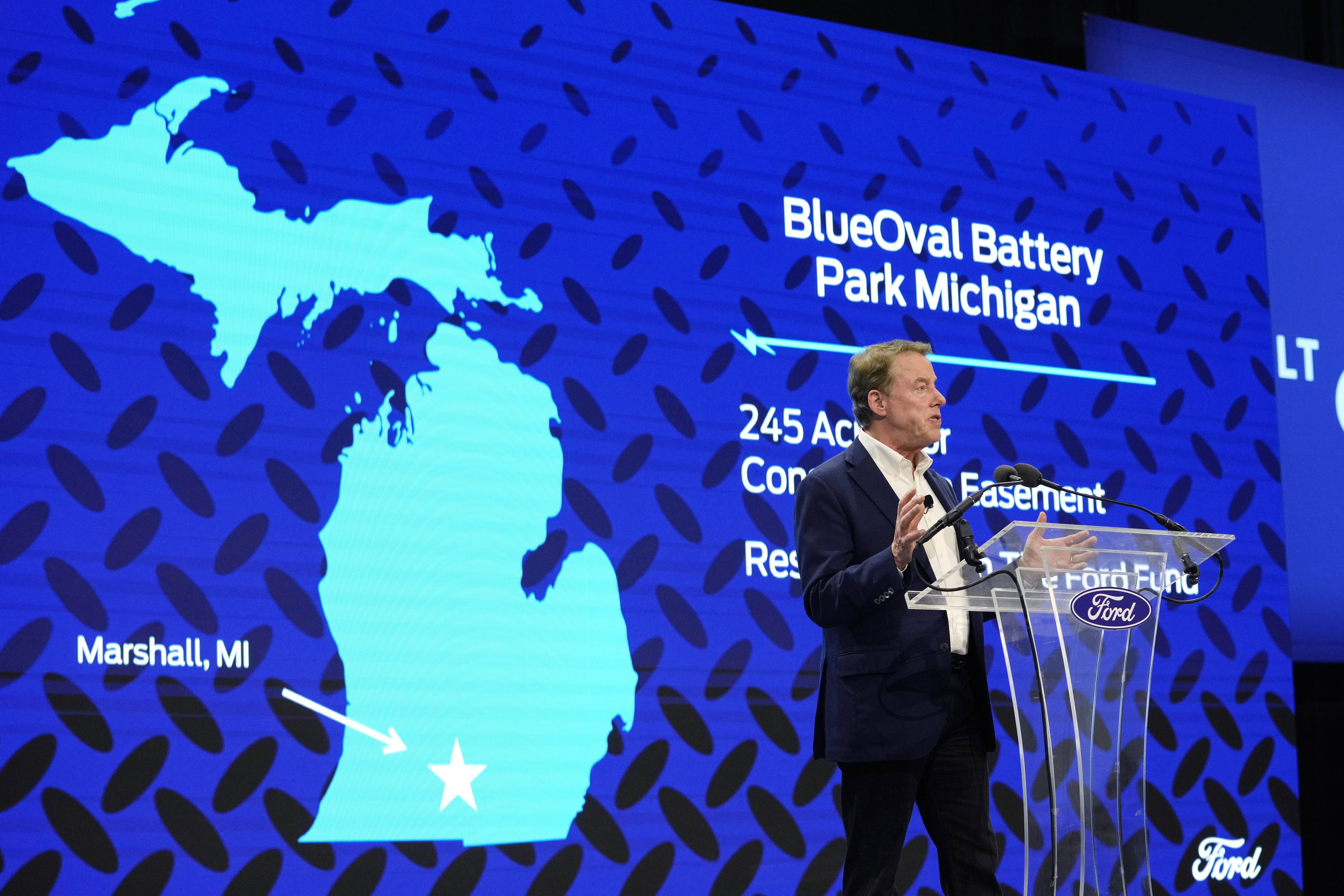UAW president Shawn Fain blasted the pause as a “shameful, barely-veiled threat by Ford to cut jobs” in a statement Monday, just days after praising

UAW president Shawn Fain blasted the pause as a “shameful, barely-veiled threat by Ford to cut jobs” in a statement Monday, just days after praising the company for making strides at the negotiating table and excluding Ford from a nationwide strike expansion.
“Closing 65 plants over the last 20 years wasn’t enough for the Big Three, now they want to threaten us with closing plants that aren’t even open yet,” Fain said. “We are simply asking for a just transition to electric vehicles and Ford is instead doubling down on their race to the bottom.”
Ford announced in February it would open the $3.5 billion plant in Marshall, Mich., by 2026, employing 2,500 workers and becoming the first automaker to manufacture next-gen lithium, iron, phosphate batteries on U.S. soil.
To do that, Ford planned to rely on licensed technology from Contemporary Amperex Technology Co., the world’s largest manufacturer of EV batteries. The Chinese firm has developed some of the most advanced LFP battery technology.
The planned facility quickly drew local and congressional pushback over the use of the technology, amid wider scrutiny of federal dollars flowing to China. The project could be eligible for incentives under the Inflation Reduction Act, which includes tax subsidies for electric vehicles and the domestic production of batteries.
Marshall residents earlier this year detailed their concerns about the project to POLITICO, including over the process leading up to its announcement, the potential environmental impacts, particularly to the Kalamazoo River, and the loss of farmland, as well as the link to China.
Residents launched a lawsuit to halt the facility earlier this year, while House Republicans opened multiple probes into the deal.
Ford has maintained that it would own and control the plant and that CATL’s involvement would be strictly as a licensor of battery cell technology and would receive no taxpayer funds.
Michigan GOP Rep. Lisa McClain wrote in a post on X, formerly known as Twitter, that the pause was “GREAT news for Michigan and a serious blow” to the Chinese Communist Party.
“Chinese technology has no place in our country and I am glad to see this battery plant be put on hold,” McClain wrote.
Sen. Marco Rubio (R-Fla.), a staunch opponent of the facility, wrote on X that Chinese firms like CATL “shouldn’t be allowed to influence American industry or public officials and they certainly shouldn’t benefit from American taxpayer subsidies.”
House Select Committee on China Chair Mike Gallagher (R-Wis.), one of the lawmakers leading a probe into the facility, called on Ford to “call off this deal for good.”
“CATL’s deep ties to CCP forced labor have no place in the American market and make the company exceptionally unfit to receive American taxpayer dollars,” he said in a statement to POLITICO.
CATL could not immediately be reached for comment.
The decision on Monday to halt construction plans comes amid the UAW strike driven in part by fears that the electric vehicle transition will leave its workers behind. President Joe Biden plans to visit the picket lines Tuesday in support of the striking workers.
Of the three automakers, UAW has cited the most progress toward reaching a deal with Ford. Even under the concessions it has put on the table, Ford is likely to see its labor costs rise at a moment when its electric vehicle unit is already struggling to compete with non-unionized carmakers like Tesla.
UAW backed the Marshall plant when it was announced in February, noting that its master agreement with Ford would allow it to organize there using a card check, rather than an election.
But the union opposed a separate $9.2 billion loan from the Energy Department for the construction of three manufacturing plants in Tennessee and Kentucky to support Ford’s electric vehicle product line because the workers there would not be covered by existing UAW contracts.
Democratic Gov. Gretchen Whitmer supports the Marshall project, which would receive hundreds of millions of dollars in state-level incentives.
In a statement on Monday, Whitmer’s press secretary Stacey LaRouche said the governor is “committed” to keeping Michigan home to “world-class” automakers and tied the pause to the ongoing union negotiations.
“Ford has been clear that this is a pause, and we hope negotiations between the Big 3 and UAW will be successful so that Michiganders can get back to work doing what they do best,” LaRouche said.
Jim Durian, the CEO of Marshall Area Economic Development Alliance, similarly said in a statement it remains “confident of the enormous potential” of the project to create local economic opportunities and jobs.
Durian added the group hopes current negotiations between Ford and the UAW “conclude in a mutually beneficial manner and we remain confident this project will continue as planned once these negotiations are complete.”
However, GOP Rep. Tim Walberg, who represents Marshall, said in a statement the Big Three automakers are “being stretched in different directions” by Biden’s EV mandate and the ongoing strike.
He added the Ford announcement “reinforces the need for the Biden administration to withdraw their unrealistic and job-destroying mandates, limit China’s role in our supply chain, put consumers back in control, and allow our automakers to innovate again.”
The White House did not immediately respond to a request for comment on Ford’s announcement. The pause was first reported by the Detroit News.
www.politico.com

COMMENTS